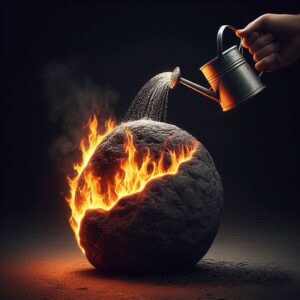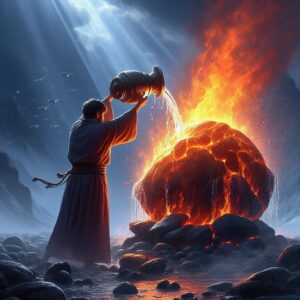焼け石に水とは?
「焼け石に水」は、問題解決のために行った努力や対策がごくわずかで、効果がほとんどないことを意味することわざです。熱く焼けた石に少量の水をかけてもすぐに蒸発してしまい、石の温度が下がることはないということから、この表現が生まれました。主に、解決が難しい状況での「無力感」や「徒労感」を表現する際に用いられます。
具体例と用例
「焼け石に水」は、例えば、以下のような場面で使われます:
経済的な困難
借金が多すぎて少額の返済ではほとんど影響がない場合など。「これだけの支払いじゃ焼け石に水だよ」。
大きな問題への小さな対策
環境問題の解決のために、少しだけ取り組んでも根本的な解決に繋がらない場合。「一人の努力では焼け石に水に過ぎないかもしれないが、それでもやらないよりはいい」。
仕事や努力が全体に与える影響が小さい
膨大な仕事量に対し、ほんの少し手をつけただけでは、ほとんど進捗がない場合。「これだけやっても焼け石に水だなと思うと、モチベーションが下がるよ」。
比喩の由来
この表現は、高温の石にわずかに水をかけたところで水が瞬時に蒸発してしまい、石自体の熱は冷めない様子から来ています。つまり、問題が「焼け石」のように大きく、対策が「水」のように少ないため、結果がほとんど感じられないという比喩表現です。日本における昔ながらの表現ですが、現代でも使われ続けている理由は、少ないリソースで大きな問題に挑むことが依然としてよくあるからです。
類似の表現
このことわざに似た表現として「小手先の対策」や「一時しのぎ」があります。これらは「根本的な解決にはならないこと」を示唆しており、「焼け石に水」と同様に、物事の解決には不十分であると表現する際に使われます。
教訓
「焼け石に水」は、現状が悪化し続けているときに、対策が不十分であれば意味が薄く、根本的な解決が求められることを教えてくれる表現でもあります。また、解決策を講じる際には、その規模や影響力が十分であるかを考慮し、可能であれば効果的な対応策を講じるべきだという教訓も含まれています。
「焼け石に水」は、努力や対策が現状に対して不十分で、実質的な効果が期待できないときに使われる表現です。無力感や効果の薄さを表す一方、こうした状況にどう立ち向かうか、より有効な解決策を探る重要性を示唆することわざとしても、現代社会で広く使われています。
Yakeishi ni mizu” is a proverb meaning that the efforts or measures taken to solve a problem are negligible and have little or no effect. The expression is derived from the fact that even if a small amount of water is applied to a hot, burned stone, it will quickly evaporate and the temperature of the stone will not decrease. It is mainly used to express a sense of “helplessness” or “futility” in a situation that is difficult to resolve.
Examples and Usage
Yakeishi ni mizu” is used, for example, in the following situationsFinancial hardship: When the debt is so large that a small payment will have little or no effect. This is a small measure to deal with a big problem: “This is just a small payment.
Small measures to a big problem: When a small effort to solve an environmental problem does not lead to a fundamental solution. ‘One person’s efforts may amount to little more than a burnt stone, but it is still better than nothing.
Small impact of work and effort on the whole: When a small amount of effort makes little progress against a huge amount of work. ‘It’s hard to be motivated when you think you’ve done all this and still come up short on the burnout.
Origin of the Metaphor
This expression comes from the way a slight splash of water on a hot stone instantly evaporates the water and does not cool the heat of the stone itself. In other words, it is a metaphorical expression that the problem is as big as a “burning stone” and the countermeasure is as little as “water,” so the result is barely perceptible. It is an old-fashioned expression in Japan, but the reason it continues to be used in modern times is that it is still common to tackle big problems with little resources.Similar Expressions
Similar expressions to this proverb include “short-term fixes” and “temporary fixes. They imply “not a fundamental solution” and are used to describe things as inadequate to solve a problem, similar to “burning stone”.Lesson Learned
Yakeishi ni mizu” is also an expression that tells us that when the current situation continues to deteriorate, if the measures taken are inadequate, they will be meaningless and a fundamental solution is required. It also contains the lesson that when implementing a solution, one should consider whether the scale and impact of the solution is sufficient and, if possible, take effective measures to deal with the situation.Conclusion
The expression “to burn the stone” is used when efforts and measures are inadequate for the current situation and cannot be expected to have any substantial effect. While expressing a sense of helplessness and ineffectiveness, it is also widely used in contemporary society as a proverb that suggests the importance of finding more effective solutions for how to confront such situations.
AIが描いた「焼け石に水」
YouTube(動画)
AIが描いたイメージ(画像)







コメント